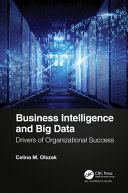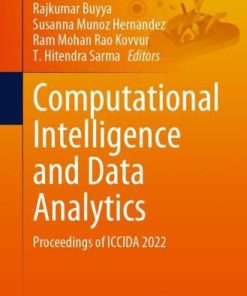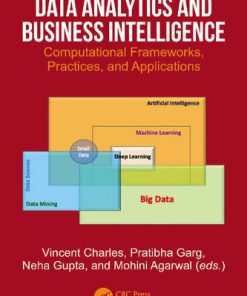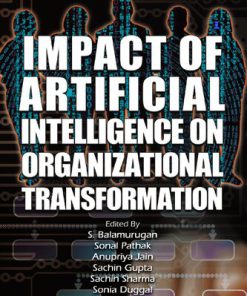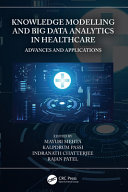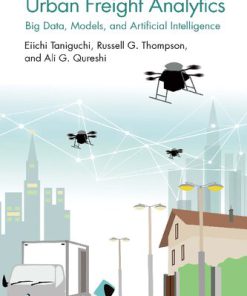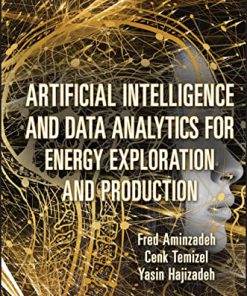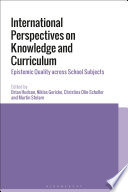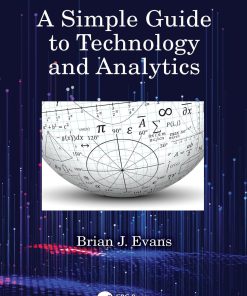Organizational Intelligence and Knowledge Analytics 1st Edition by Brian Mcbreen, John Silson, Denise Bedford ISBN 9781802621778 1802621784
$50.00 Original price was: $50.00.$25.00Current price is: $25.00.
Organizational Intelligence and Knowledge Analytics 1st Edition by Brian Mcbreen, John Silson, Denise Bedford – Ebook PDF Instant Download/Delivery: 9781802621778 ,1802621784
Full download Organizational Intelligence and Knowledge Analytics 1st Edition after payment
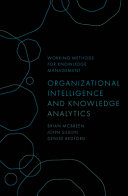
Product details:
ISBN 10: 1802621784
ISBN 13: 9781802621778
Author: Brian Mcbreen, John Silson, Denise Bedford
Organizational Intelligence and Knowledge Analytics 1st Edition Table of contents:
Section 1. Knowledge and Intelligence
Chapter 1. Intelligence in Knowledge Economies and Organizations
Chapter Summary
Why We Care about this Topic?
Intelligent Organizations and the Knowledge Economy
Intelligence – Definition and Characterization
Intelligence as a Thing and an Attribute
Intelligence as a Behavior and Way of Working
Organizational Syntropy and Intelligent Behaviors
Intelligent Business Activities and Operations
Intelligent Organizational Cultures and Communications
Intelligent Cultivation and Leveraging of Knowledge Capital
Intelligent Leadership
Intelligent Learning Systems
Entropy and Organizational Pathologies
Uncertainty
Complexity
Ambiguity
Equivocality
Tyranny of Current Intelligence
Overemphasis of Codified Intelligence
Over-Reliance on Previous Judgments
Neglect of Research
Neglect of Anticipatory Intelligence
Loss of Intellectual Middleware
Overemphasis on Analytical Tools and Methods
Hindrance of the Security Mindset
Learning to See Organizational Intelligence and Stupidity
Chapter Review
References and Recommended Future Readings
Chapter 2. Traditional Intelligence Work
Chapter Summary
Why We Care about this Topic?
Knowledge and Intelligence in the Industrial Economy
Intelligence Sectors in the Industrial Economy
The Traditional Intelligence Life Cycle Model
What Do the Planning and Direction Involve?
What Does the Collection Stage Involve?
What Does the Processing and Exploitation Stage Involve?
What Does the Analysis and Production Stage Involve?
What Does the Dissemination and Integration Stage Involve?
Historical Evolution of Intelligence Work
What We Can Learn from Each Intelligence Domain?
Domain 1. Military Intelligence
Domain 2: Business and Competitive Intelligence
Domain 3: Law Enforcement and Judicial Investigations
Domain 4: Judicial Forensics and Investigations
Domain 5: National Security Work
Domain 6: Market Intelligence Process
Domain 7: Financial Intelligence Process
Domain 8: Medical Diagnostics and Intelligence Process
Domain 9: Digital Forensic Analysis
Domain 10: Computer Forensics Process
Chapter Review
References and Recommended Future Readings s
Chapter 3. Intelligence Work for the Knowledge Economy
Chapter Summary
Why We Care about this Topic?
The Future of Intelligence Work in the Knowledge Economy
Future Intelligence – Definition and Characterization
Conceptual Framework of the New Intelligence Work
Design Capabilities
Analytical Capabilities
Automation Capabilities
Acceleration Capabilities
Chapter Review
References and Recommended Future Readings
Chapter 4. Knowledge Capital as an Intelligence Source
Chapter Summary
Why We Care about the Use of Knowledge?
Leveraging Knowledge in the Intelligence Framework
Knowledge Capital – Definitions and Characterizations
Human Capital Assets
Structural Capital Assets
Relational Capital Assets
Knowledge Assets by Intelligence Capabilities
Knowledge in the Design Capability
Knowledge Assets in the Analysis Capability
Knowledge Assets in the Automate Capability
Knowledge Assets in the Accelerate Capability
Chapter Review
References and Recommended Future Readings
Section 2. New Intelligence Capabilities
Chapter 5. The Design Capability
Chapter Summary
Why We Care about this Topic?
Design – Definition and Characterization
Design as a Way of Thinking
Design as a Way of Working
Environmental Scanning
Problem Detection and Discovery
Problem Decomposition and Recomposition
Brainstorming
Critical Thinking
Problem Definition
Hypothesis Development
Factor Identification
Model Building
Source Identification
Blueprinting
Degrees of Design Thinking and Design Working
Chapter Summary
References and Recommended Future Readings
Chapter 6. Analysis Capability
Chapter Summary
Why We Care about this Topic?
Analysis – Definition and Characterization
Analytical Capabilities
Blueprinting and Engineering the Design
Analytical Method Selection
Model Setup
Explaining Assumptions and Constraints
Source Collection
Source Organization
Source Curation and Cleaning
Testing of the Model
Interpretation of Testing Results
Assessment of Testing Results
Recomposition
Degrees of Analysis – Thinking and Working
Chapter Review
References and Recommended Future Readings
Chapter 7. The Automate and Operationalize Capability
Chapter Summary
Why We Care about this Topic?
Automation and Operationalization – Definition and Characterization
Automation and Operationalization Capabilities
Establish Business Model
Build to Operate Model
Operationalize and Deploy
Train and Retrain
Monitoring, Feedback, and Anomaly Detection
Chapter Review
References and Recommended Future Readings
Chapter 8. The Accelerate Capability
Chapter Summary
Why We Care about this Topic?
Acceleration – Definition and Characterization
Acceleration and Integration Capabilities
Review and Reaffirmation of the Fundamental Business Model
Integrating New Capabilities into the Institutional Product Line
Cross-organization Socialization and Adoption of New Capabilities
Adaptation and Calibration
Chapter Review
References and Recommended Future Readings
Section 3. Sustaining the Intelligent Organization
Chapter 9. Capacity Building for Organizational Intelligence and Analytics
Chapter Summary
Why We Care about Intelligence Capacity?
Capacity Building – Definitions and Characterizations
Building Capacity for Organizational Intelligence Holistically
Building Knowledge Capacity Strategically
Building Organizational Capacity Through Individual Actions
Building Organizational Capacity Collectively
Organizational Intelligence Roles and Responsibilities – Future State
Strategic Organizational Intelligence Responsibilities
Specialized Organizational Intelligence Roles and Responsibilities
Business-aligned Organizational Intelligence Roles and Responsibilities
Universal Organizational Intelligence Roles and Responsibilities
Role of Culture in Building Intelligence Capacity
Building Capacity for the Short and Long Term
Role of Learning in Intelligence Capacity
Expanding the Strategy Beyond Analytics
Balancing Capacity Across Domain and Specialized Operations
Chapter Review
References and Recommendations For Future
Chapter 10. Organizational Intelligence Roles, Responsibilities, and Competencies
Chapter Summary
Roles, Responsibilities, and Competencies – Definitions and Characterizations
Definitions of Roles and Responsibilities
Definition of Competencies
People and Work Competence
Levels and Alignments of Roles and Responsibilities
Strategic Roles and Competencies
Specialized Roles and Competencies
Business-aligned Roles and Competencies
Universal Roles and Competencies
Definition of Proficiency
Chapter Summary
References and Recommending Readings for Future
Chapter 11. Crafting and Sustaining an Organizational Intelligence Strategy
Chapter Summary
Why We Care about Intelligence Strategies?
Organizational Intelligence Strategies
Visions of Intelligent Organizations
Missions and Goals of Intelligence Work
Intelligent Cultures
Intelligence Strategies
Tactics
Chapter Summary
References and Recommended Future Reading
Chapter 12. Business Stories of Intelligent Organizations
Chapter Summary
Why We Care about Business Stories?
Business Story 1. Proactive Leading Indicators in a Strong Safety Culture
The Example
The Problem
The Solution
Chapter Touchpoints
Business Story 2. Automated Signal Detection in Competitive Intelligence
The Example
The Problem
The Solution
Chapter Touchpoints
Business Story 3. Augmented Trending Analysis in Manufacturing Quality
The Example
The Problem
The Solution
Chapter Touchpoints
Business Story 4. Solving for Global Staffing Alignment
The Example
The Problem
The Solution
Chapter Touchpoints
Business Story 5. Modeling Elections without Data
The Example
The Problem
The Solution
Chapter Touchpoints
Business Story 6. Projecting the Course of COVID and the Economy
The Example
The Problem
The Solution
Chapter Touchpoints
Business Story 7. Designing Intelligence into Energy Systems Maintenance
The Example
The Problem
The Solution
Chapter Touchpoints
Business Story 8. Intelligent Insurance Risk Models
The Example
The Problem
The Solution
Chapter Touchpoints
Business Story 9. Augmented Monitoring of Climatic Events
The Example
The Problem
The Solution
Chapter Touchpoints
Business Story 10. Multivariate Market Discovery
The Example
The Problem
The Solution
Chapter Touchpoints
Reference
Appendix A. Pulling it all Together – Sample Project Plan: Pulling it all Together
Chapter Summary
Explaining the Project Plan
How to Use the Project Plan?
Appendix B. Toolkit of Analytical Methods: Developing a Toolkit of Analytical Methods
Index
People also search for Organizational Intelligence and Knowledge Analytics 1st Edition:
what is organizational intelligence
organizational intelligence examples
organizational intelligence pdf
organizational analytics
an organized competitor intelligence system
Tags:
Brian Mcbreen,John Silson,Denise Bedford,Organizational Intelligence,Knowledge Analytics
You may also like…
Uncategorized
Business Intelligence and Big Data: Drivers of Organizational Success 1st Edition Olszak
Computers - Databases
Computational Intelligence and Data Analytics: Proceedings of ICCIDA 2022 Rajkumar Buyya
Computers - Organization and Data Processing
Business & Economics - Management & Leadership
Computers - Organization and Data Processing
Business & Economics - Logistics
Urban Freight Analytics: Big Data, Models, and Artificial Intelligence 1st Edition Eiichi Taniguchi
Education Studies & Teaching - Education Management & Organisation
Computers - Computer Science



